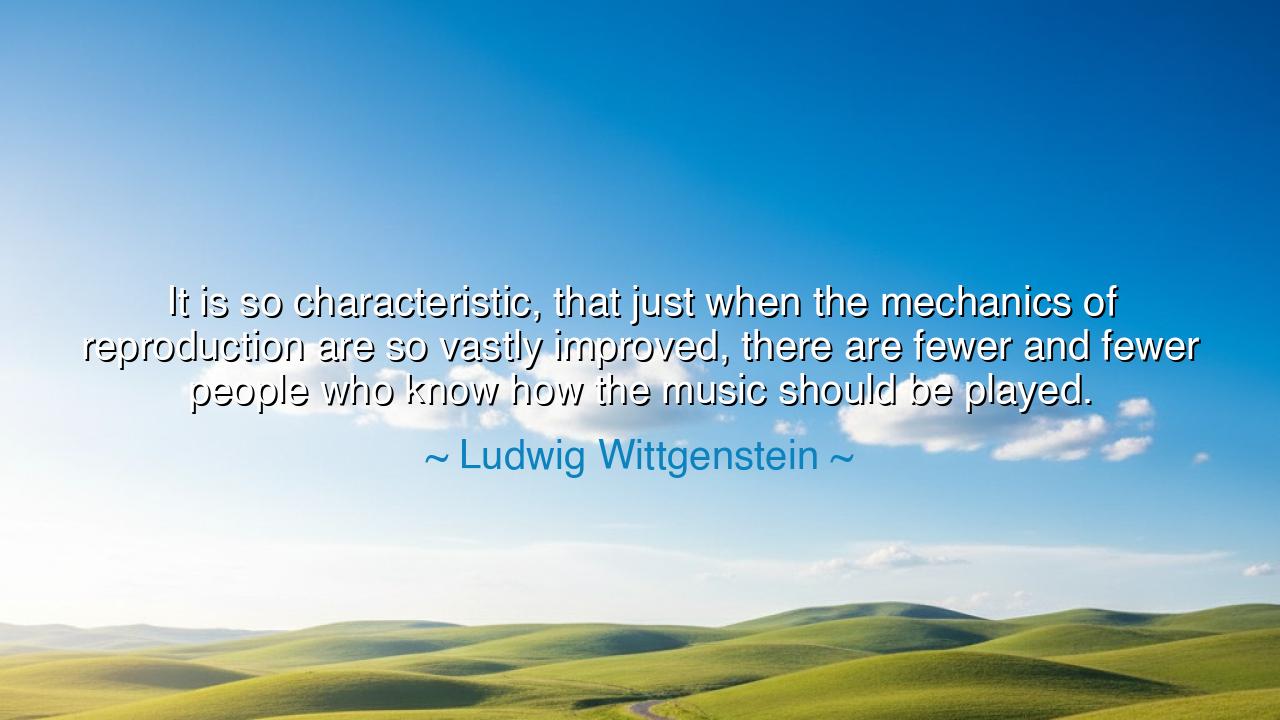
It is so characteristic, that just when the mechanics of
It is so characteristic, that just when the mechanics of reproduction are so vastly improved, there are fewer and fewer people who know how the music should be played.






Ludwig Wittgenstein, the philosopher who pierced through the illusions of language and thought, once observed with lament: “It is so characteristic, that just when the mechanics of reproduction are so vastly improved, there are fewer and fewer people who know how the music should be played.” In these words, he unveils a timeless paradox: as human tools and technologies advance, the very spirit they are meant to serve often withers. The mechanics of sound—its clarity, its volume, its perfection—may reach heights undreamed of in earlier ages, yet the soul of music, the living art of how it should be played, fades into silence.
The ancients knew this danger well. They warned that knowledge of technique is not the same as wisdom, and mastery of tools is not mastery of the soul. A finely forged sword in the hands of one without honor is no true weapon of justice, but only a sharper tool of destruction. Likewise, Wittgenstein warns that in the age when the mechanics of sound are flawless—recordings pristine, instruments refined, machines capable of endless replication—there is a famine of true understanding of the music itself, the living essence that no machine can create.
Consider the story of the player piano in the late 19th century. For the first time, a machine could reproduce complex compositions without a human performer. The keys struck with perfect timing, every note falling as written. Yet those who listened soon discovered an absence—the subtle breath, the human hesitation, the swell of emotion that only a living player can summon. The mechanics were perfect, but the music was dead. Wittgenstein’s words echo in that history: the machine could repeat the notes, but it could not know how the music should be played.
The same truth was revealed in the life of Johann Sebastian Bach. When his works were first performed, they were played with reverence and fire by those who knew his vision. But for nearly a century after his death, many of his compositions were reduced to dry exercises for students, lifeless demonstrations of counterpoint. The mechanics were taught—the notes, the theory, the structure—but the spirit was lost. Only in the 19th century, when Felix Mendelssohn revived the St. Matthew Passion, did the world rediscover the living music within Bach’s notes. This revival proved that mechanics alone cannot preserve meaning; only living understanding can.
Wittgenstein’s warning is not about music alone. It is about life. In every age, humanity builds greater tools, sharper machines, more powerful methods. Yet often, as the mechanics are perfected, the wisdom to use them fades. We build schools but forget the meaning of learning. We craft words but lose the art of truth. We advance medicine but neglect the spirit of healing. Just as with music, so with life: the more flawless the reproduction, the more fragile the meaning.
The lesson is clear: do not mistake mechanics for mastery. A song is not the notes, but the life breathed into them. A life is not the schedule, but the meaning poured into it. Do not be content to perfect the surface while the soul lies silent. Learn not only how to perform, but how to feel. Learn not only how to speak, but how to understand. Learn not only how to act, but how to live. For only then can the music of your life be truly heard.
Practical wisdom follows: when you listen to music, listen not only for clarity but for spirit. When you work, do not only perfect the tool—perfect the heart that guides it. When you create, ask yourself not only whether it is flawless, but whether it carries truth. Cultivate depth, not only polish. Seek meaning, not only replication. In this way, you will live against the tide Wittgenstein mourned, and you will know not only the mechanics, but the very soul of the music.
So remember Wittgenstein’s words as a warning and a guide: “Just when the mechanics of reproduction are so vastly improved, fewer and fewer know how the music should be played.” Let it remind you that perfection of form is empty without spirit, that knowledge without wisdom is hollow, and that the true task of life is not only to build, but to understand, to feel, and to play the music of existence as it was meant to be heard.






AAdministratorAdministrator
Welcome, honored guests. Please leave a comment, we will respond soon